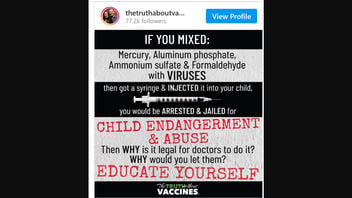
Are chemical mixtures made at home comparable to vaccines approved by the U.S. Food and Drug Administration (FDA)? No, that's not true: Vaccines, which mostly consist of weakened or killed viruses or bacteria to boost the body's immune response, may include chemicals that stabilize the mixture, preserve it or boost the body's immune response. Few -- if any -- home chemists have the facilities to create vaccines as precisely formulated and sanitary as those produced in regulated and inspected labs. Licensed and safety-tested vaccines save lives and slow or prevent the spread of disease, while DIY vaccines are discouraged by law and by medical experts.
The comparison was made in a meme in an Instagram post (archived here) published on December 10, 2020, with the introductory text "Please, help us wake up others so that future children don't have continue to be forced into child endangerment." The meme read:
IF YOU MIXED: Mercury, Aluminum phosphate, Ammonium sulfate & Formaldehyde with VIRUSES then got a syringe & INJECTED it into your child, you would be ARRESTED & JAILED for CHILD ENDANGERMENT & ABUSE
Then WHY is it legal for doctors to do it? WHY would you let them? EDUCATE YOURSELF
This is what users saw on social media:
The post is accurate insofar as it lists some common ingredients found in vaccines.
The ingredients may sound scary, but that does not mean they're dangerous. All ingredients play a role. For instance, formaldehyde is used to prevent contamination during the manufacturing process. Aluminum salts, such as aluminum phosphate, help to boost the body's response. Neither has been proven to pose a significant safety concern in the small amounts found in vaccines.
A more detailed list of ingredients, and explanations of each, can be found on the FDA's website.
The post's broader contention, however, is that making a chemical mixture at home and giving it to your child is equivalent to a doctor administering a vaccine. That's not true.
Vaccines undergo rigorous testing before the public begins using them and are monitored after, as well. Here's what the Centers for Disease Control and Prevention (CDC) says about vaccine safety:
Before a vaccine is ever given to people, FDA oversees extensive lab testing of the vaccine that can take several years to make sure it is safe and effective. After the lab, testing in people begins, and it can take several more years before the clinical studies are complete and the vaccine is licensed.
Once a vaccine is licensed, FDA, CDC, National Institutes of Health (NIH), and other federal agencies routinely monitor its use and investigate any potential safety concerns.
The FDA, which is the agency that must approve a vaccine before it can be used in the United States, outlines the process as follows: If laboratory tests show that a vaccine has potential, it is then usually tested in animals. If the vaccine is considered safe in animals, development moves to clinical trials on human volunteers, and those trials proceed in three phases. The number of volunteers grows with each phase, as does the information collected and reviewed. The results of the trials are part of what the FDA looks at to evaluate a vaccine's safety and effectiveness. Here's more from the FDA:
In addition to evaluating the results of the clinical trials, FDA scientists and medical professionals carefully evaluate a wide range of information including results of studies on the vaccine's physical, chemical, and biological properties, as well as how it is manufactured, to ensure that it can be made consistently safe, pure, and potent.
The trials and all other data must show that the vaccine's benefits outweigh the potential risks for people who will be recommended to receive the vaccine. Only if a vaccine's benefits are found to outweigh its potential risks does the FDA grant a license for the vaccine, allowing it to be used by the public.
All this is not to say that vaccination proceeds at zero risk. Per the CDC, vaccines can cause mild side effects, such as a fever or redness at the injection site, but "severe, long lasting side effects are extremely rare." Again, here's the CDC:
Vaccines are the best defense we have against infectious diseases, but no vaccine is actually 100% safe or effective for everyone because each person's body reacts to vaccines differently.
As infectious diseases become less common, we hear less about the serious consequences of preventable illnesses like diphtheria and tetanus and more about the risks associated with vaccines. It's good to be informed about health choices, but the reality is that Americans have never been healthier than we are today and vaccines have never been safer than they are today. The benefits of vaccines far outweigh the risks.
Similarly, the World Health Organization recommends vaccines, describing immunization as a "global health and development success story." The WHO estimates that immunization prevents up to 3 million deaths every year.












